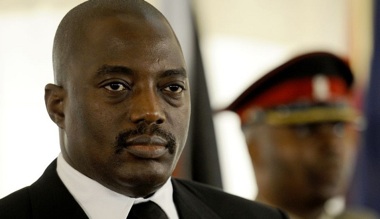Joseph Kabila — will he relinquish power at end of term?
[Africa: Commentary]
As 2014 comes to a close, the dominant challenge facing Congolese people is the lengths to which President Joseph Kabila will go to maintain a stranglehold on power.
This unresolved question represents the greatest threat to peace and stability in the Democratic Republic of Congo (DRC). It will continue to dominate the political landscape through 2016, when Kabila is constitutionally mandated to leave office. He will have completed the second of his two five-year terms (2006 – 2011 and 2011 – 2016) in December 2016.
Leaders in Kabila’s Presidential Majority coalition have called for the constitution to be modified so that he can run for a third term. Even before its ratification in 2006, the Congolese constitution has been perverted to suit Kabila’s personal interest.
For example the minimum age required to run for President was lowered from 35 to 30 so that Kabila who was then 34 years old could qualify to run for President in the 2006 elections. In 2011, Kabila modified the constitution to facilitate the appropriation of the November 2011 elections.
This time, the Congolese people led by the Catholic Church and 600-plus civil society organizations have said enough is enough. They have called on President Kabila not to touch the constitution, to organize elections at all levels (local, provincial and national) and to step down after the completion of his second term in 2016.
While Kabila’s Presidential Majority coalition has been vocal about his remaining in power, Kabila has remained silent on whether he will stay or leave. Nonetheless, his actions have strongly indicated that he plans to stay by any means necessary.
Options at his disposal include: changing the constitution, outright scrapping the constitution and initiating a new one; and delaying the 2016 Presidential elections through various measures. Kabila has reorganized the military to strengthen his hand and reshuffled the government under the misnomer “coalition government” in order to bring more political opportunists into the fold.
Kabila’s 2014 “message to the nation” on Monday, December 15th helped to further cement his intention to remain in power beyond 2016. During his speech, he warned against foreign “injunctions” as if calls from European nations and the United States for him to step down after 2016 represent the greatest demand on him to respect the country’s constitution. In fact, the strongest resistance to Kabila remaining in power comes from Congolese inside the country.
Kabila also proclaimed during his speech that peace and stability has prevailed throughout the country, however, this is far from the case. The people of Beni in the North Kivu province have endured tremendous suffering, especially over the past two months. Over 250 people have been senselessly massacred. President Kabila paid a “too late, too little” visit to Beni in late October, ostensibly to demonstrate some level of concern for the inhabitants.
Following his visit, angry youth disfigured and tore down a statue of Kabila to express their outrage and dissatisfaction with his lack of leadership and the inability of the state to protect the people. Elsewhere, in the Katanga province, over a half million people have been displaced due to militia activity. Peace and stability remains fleeting under Joseph Kabila’s leadership.
A critical mass of Congolese youth and others have had enough. The question is often asked and widely debated as to whether the kind of mass mobilization that took place in Burkina Faso that resulted in the ousting of President Blaise Compaoré can happen in the Congo or whether that uprising influenced the Congolese populace? Of course it has influenced Congolese youth and the Congolese government as well. Whether what transpired in Burkina Faso can actually happen in the DRC is yet to be seen.
The hope is that people will not have to descend into the streets to make President Kabila respect the laws of the land. The expectation is that the pressure being applied by the Catholic Church, Civil society, youth throughout the country, noted Congolese figures such as Dr. Denis Mukwege of Panzi Hospital, politicians in the presidential majority, the opposition and others in the global community, will be sufficient to facilitate respect for the country’s constitution and a peaceful transition to a new leadership in 2016.
Congolese youth and others are very clear about what is at stake. The moves made by the Kabila regime are based primarily on how he and his coterie of elites can remain in power and continue to benefit from their positions in the government at the expense of the people.
The next couple of years will be a critical test for the Congolese people and those who have invested in peace and stability in the country. The central challenge remains the same since the modern founding of the DRC; will masses of Congolese be able to finally control and determine the affairs of the Congo so that they can be the primary beneficiaries of the country’s spectacular wealth?
A required vital pillar to peace and stability in the Congo is a government and leadership that benefits from the popular will of the people. The Congolese people are in dire need of a government that serves and protects the interests of the masses. A social and political landscape where the people have a say in the decision-making process is paramount for peace and stability. It is only when the sons and the daughters of the Congo organize and mobilize to create such an environment that we will finally know and experience peace and be able to extricate ourselves from crushing poverty and perpetual dependency.
Kambale Musavuli, a native of the Democratic Republic of Congo and one of the leading political and cultural Congolese voices, is a social entrepreneur, human rights advocate and spokesperson for the Friends of the Congo. Follow him on twitter @kambale or Facebook at https://www.facebook.com/kambalemusavuli







